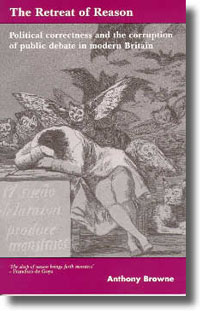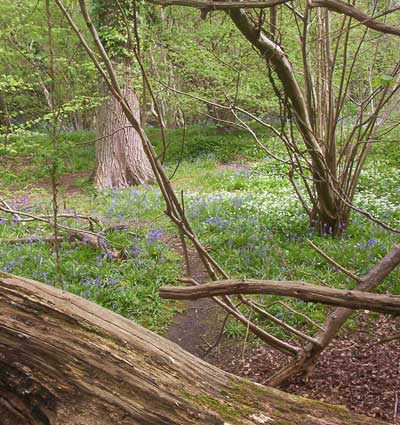Book review: The retreat of reason (Anthony Browne, 2006)
- Complaining about the Mainland - 17th August, 2024
- New island designation – is it just greenwash? - 26th April, 2024
- Police and Crime Commissioners – a solution or a problem? - 21st April, 2024
A friend lent The Ranger a book for his entertainment; “The Retreat of Reason: Political Correctness and the Corruption of Public Debate in Modern Britain”. This provocatively-titled pamphlet was written in 2006 by Anthony Browne; a former journalist and now Policy Director for the Mayor of London. The pamphlet has had considerable influence and has been praised by many commentators. The journalist Melanie Phillips called it “a tremendously important pamphlet about political correctness… which explains just why Britain has apparently lost its senses“. AC Grayling, in the New Statesman, praised Browne’s “eloquent voice“.

Much has been written about this publication, especially about the views on immigration and race contained within it: either critical of the author’s attitude (Julian Petley, Fifth-Estate-Online; Dave Hill, The Guardian), or supportive (AC Grayling, New Statesman; Stormfront). It’s probably worth pointing out that although the British National Party do sell the book online, as is often mentioned, they seem to be rather critical of it, ironically complaining that “Browne goes all PC again by taking another swipe at the BNP“. I found the substance of ‘The Retreat of Reason’ disappointing: poorly argued, more of an exhortation to the uncritical than any attempt to form a rational position to persuade others. I didn’t think it a racist book, nor is the author a racist. But what was startling and unexpected to this Ranger was the remarkable section that Browne, a former environment editor of the Times, wrote about environmentalism, and on biodiversity in particular. Do biodiversity, pollution, protected species and habitats have a bearing on political correctness? Surprisingly, Browne thinks they do, and makes some striking assertions whilst explaining how. Browne argues – or rather asserts, as that is his style – that what he calls ‘the environmental movement’ has essentially succeeded in its mission. He implies that further environmental campaigning would merely be an unnecessary, politically correct reflex. Environmentalism, he says, was one of the most successful mass movements of all time, which from the 1970s onwards “put [environmental degradation] on the political agenda, confronted vested interests, won the main intellectual arguments, and was the driving force behind the dramatic change in attitudes and legislation.” You’d think this was a good thing, but Browne continues and explains why he thinks it isn’t.
The environmental movement in the West has become the victim of its own extraordinary success. In the UK, the rivers are cleaner than they have been since before the industrial revolution, the air in London is the cleanest it has been for over 300 years and forest cover is the highest it has been for more than 200 years, even if you discount monocultural conifer plantations. Rather than species becoming extinct, previously nationally extinct species are being reintroduced from other parts of the world, and endangered species such as otters and wild boars are thriving. Acid rain is no longer a problem, and the ozone layer is healing itself after suitable action was taken. Global warming is, however, still a threat.[Civitas website, PDF]
This extraordinary catalogue – set out by a writer employed by the Mayor of London as a policy expert on the environment – cannot be left to rest. Browne uses these arguments chiefly to support his view that this was achieved by the ‘politically correct’ stifling debate, and so for him, in this respect the environment is just one of many areas he calls on in his larger thesis. That wider argument can be dealt with by others. But this part of the book is one that deals with my own particular sphere of knowledge. If I look carefully at the part I am competent to assess, perhaps it will help me form a view on the merits of the rest of the book. Let’s test his assertions. As Browne doesn’t tend to support his claims with references I’ll be restricted to looking at them as they stand, but I’ll try to lead by example and bring a few facts in to support what I say. The cleanest rivers and cleanest air since whenever? These are probably true, and the Environment Agency certainly thinks so. Convenient, maybe, to merely look at the UK, when other parts of the world, even the west, are less successful in reducing pollution. How about forest cover? This is the example Browne uses to demonstrate that habitat loss is being used as a politically correct tool by environmentalists. Well, in the short term, and, again, in the UK, there is something in his assertion if the figures are taken on face value (see this Excel table from DEFRA). But the huge, indeed fatal, problem with this interpretation is the assumption that one tree is as good as another – or, more specifically, that it is possible to compensate for the loss of woodland habitat by planting individual trees. This is very far from the case.

Taking a long view, the oldest woodlands – known as ancient woodlands – are of special and irreplaceable value. They are still being lost to development and other damage today. Even if huge numbers of trees are planted, and survive, elsewhere, this will not result in the creation of ancient woodland for many centuries, if ever. The Woodland Trust explains it well:
Ancient woodland in terms of biodiversity is the most valuable habitat we have in the UK. Three thousand years ago, it covered the vast majority of the land area of the UK. It now covers just 2 per cent. Of the ancient woodland on the Ancient Woodland Inventory, which existed in the 1930s, around 50 per cent has now been lost, especially in the last 40 years mostly due to coniferisation, encroachment by agriculture and development. 85% of ancient woodland currently has no protection under wildlife legislation, as only 15% has the status of a Site of Special Scientific Interest.
What’s more, the continued loss of ancient woodland today suggests that if the ‘intellectual argument’ has indeed been won – and few would say it had not – that victory has yet to stop the loss of irreplaceable habitat. Browne is not reluctant to draw inspiration from America to support his arguments, so it’s fair to observe that there the picture of woodland decline is even starker: see this map of ancient woodland loss in North America since 1620. Other habitats in the UK have done equally badly or worse: chalk grasslands, for example showed a loss of 20% between 1966 and 1980 – to take a statistic from the period Browne refers to. Similarly, only about 70,000 ha of lowland heathland remains in the UK, about 16% of its extent in the 19th century. Many other habitats show similar declines. It seems possible that Anthony Browne’s choice of UK woodland for his example was informed by popular perception of habitats and an over-simplistic understanding of what a habitat actually is. But what of endangered species? Are the concerns of ecologists about species loss merely another example of what Browne memorably calls “a politically correct paradigm… in which the world’s environment was presumed to be going to hell in a handcart“? He boldly sweeps the entire concept of species loss aside by asserting that “Rather than species becoming extinct, previously nationally extinct species are being reintroduced“. As an argument this is nonsense. It is true that a very few species which were previously extinct in the UK have been reintroduced from elsewhere. The number is tiny, the risk and expense of doing so is high, and the long-term success is doubtful unless habitat restoration also occurs. But even so there is no possible connection between these few reintroductions and the many extinctions which have taken place and continue to do so. In 2006, the year this book was published, World Conservation Union (IUCN) director-general Achim Steiner said “The 2006 Red List shows a clear trend; biodiversity loss is increasing, not slowing down“. Since then the trend has not altered. Browne then goes on to give bizarre examples of thriving ‘endangered’ species – otters and wild boar. Otters in the UK are recovering territory, for certain, but can hardly be said to be thriving. Wild boar is the one that would make anyone with a superficial knowledge of UK biodiversity groan. Wild boar are neither endangered nor native, nor do they have any legal protection. Feral populations have escaped from captivity and established themselves in parts of the UK. One may as well suggest that endangered species are doing well because of the wallabies loose in the countryside. Finally, Browne tips his hat to a few other issues, although it would be hard to imagine how he could salvage anything from the wreckage now. Acid rain, he claims helpfully, is no longer a problem (it is), and the ozone layer is healing itself (it isn’t – although the rate of depletion has slowed considerably). But at last, he winds up with an unassailable statement: one that environmental scientists would now claim is the single biggest and most threatening issue of all. Global warming, he writes sagely, is still a threat. Yes, Anthony, indeed it is. Well spotted. It is a threat that may well undo all the other issues above, and also put the lie to the capitalist economic system that your book so plaintively trumpets as “one of the best things that humanity has invented”. Browne asserts with touching faith that “capitalist societies have done far more to preserve their natural resources than any other non-primitive societies“. How sad that he failed to make the connection between global warming and the capitalist nations – and indeed almost all nations, under all modern economic systems. Global warming and the environment are issues that transcend politics and economics, though undoubtedly adapting to living in a world with these problems must include great political and economic changes. Anthony Browne started with some interesting ideas, but fumbled the ball. By writing what amounts to an extended tabloid leader, and using environmental issues glibly and inaccurately, he has compromised the rest of his own assertions and arguments. If Browne set out to open a serious debate; for me, “The Retreat of Reason” is an opportunity missed.
